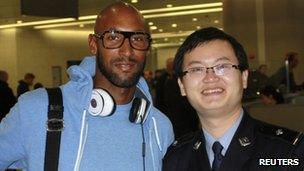Top China football referee Lu Jun jailed over bribes
- Published
The BBC's Michael Bristow: "The investigation has ensnared referees, players, coaches and even senior administrators within the football federation"
The man who was once China's top football referee has been sentenced to five-and-a-half years in jail for taking bribes to fix matches.
Lu Jun - who officiated at the World Cup - was one of nine people convicted of charges related to corruption inside Chinese football.
The defendants were arrested following an investigation launched to try to clean up the game in China.
A number of other cases are still pending.
Lu Jun, once dubbed the "golden whistle", was the first Chinese referee to take charge of a World Cup match, at the 2002 event hosted by Japan and South Korea.
He was also twice named referee of the year by the Asian Football Confederation.
But now he has been sent to prison after admitting taking bribes worth more than $128,000 (£82,000) to fix the results of seven league football games, some in 2003.
These bribes involved four clubs, including Shanghai Shenhua, which has just signed French soccer star Nicolas Anelka.
'Black whistles'
The court, in the north-eastern city of Dandong, heard how the Shanghai club had spent nearly $1m bribing officials and referees, including Lu Jun.
The referee was one of a group of nine people - including other referees and officials - convicted following a trial. They were given sentences ranging from no time in jail to seven years behind bars.

Soccer star Nicolas Anelka arrived on Wednesday to play for Shanghai Shenhua
There were tales of a wrongly-awarded penalty, the fixing of international friendly matches and gambling.
In China, corrupt referees have become known as "black whistles".
Dozens of people - referees, players, officials and coaches - have been arrested following a campaign to clean up Chinese football, launched in 2009.
Corruption has blighted the beautiful game here for some years, leading many Chinese fans to support European teams instead.
Last season, though, there was new investment - and enthusiasm - for football in China. That has been heightened with the arrival of Anelka.
But the trials of two former senior officials in the Chinese Football Association - the two bigger fishes, as the state-run news agency Xinhua calls them - have yet to start.
- Published1 April 2011
- Published6 July 2010